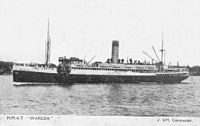HMAT Warilda

| |
| History | |
|---|---|
| Name | Warilda |
| Operator | |
| Builder | William Beardmore and Company, Glasgow |
| Yard number | 505 |
| Launched | 5 December 1911 |
| Maiden voyage | 1912 |
| Fate | Torpedoed by German U-boat UC-49 on 3 August 1918.[1] |
| General characteristics | |
| Tonnage | 7713 tons gross |
| Length | 411 feet 3 inches (125.35 m) |
| Beam | 56 feet 7 inches (17.25 m) |
| Draught | 34 feet 1 inch (10.39 m) |
| Installed power | 626 nhp on 6 coal-fired boilers |
| Propulsion | Twin quadruple expansion engines |
| Speed |
|
HMAT Warilda (His Majesty's Australian Transport) was a 7713-ton vessel, built by William Beardmore and Company in Glasgow as the SS Warilda for the Adelaide Steamship Company.[2] She was designed for the East-West Australian coastal service, but following the start of the First World War, she was converted into a troopship and later, in 1916, she was converted into a hospital ship.
Her identical sister ships, also built by William Beardmore and Company, were SS Wandilla (1912) and SS Willochra (1913).[citation needed]
Time as a troopship
- 5 October 1915: 10th Reinforcements, 9th Battalion embarked from Brisbane heading to Egypt.:[3] 15 Batt embarked Brisbane HMAT A69 Warilda same date[4]
- 8 October 1915: 10th Reinforcements, 1st Infantry Battalion embarked from Sydney heading to Egypt.[5]
- 8 October 1915: 10th Reinforcements, 1st Brigade of the AIF, embarked from Liverpool, NSW, Australia. The ship arrived at Fremantle, Western Australia on 15 October 1915, and reached Suez on 5 November, when the troops were disembarked.[6]
- 25 May 1916: Tunneling Companies, 2 Reinforcements embarked Melbourne.[7]
- 1 June 1916: Tunneling Company 6, 3rd Tunneling Company embarked from Fremantle, Western Australia 1 June 1916. Disembarked Plymouth, England, 18 July 1916.[8]
Sinking
On 3 August 1918, HMAT Warilda was transporting wounded soldiers from Le Havre, France to Southampton when she was torpedoed by the German submarine UC-49.[9] This was despite being marked clearly with the Red Cross; as with a number of other hospital ships torpedoed during the war, Germany claimed the ships were also carrying arms.[10]
The ship sank in about two hours, and of the 801 persons on board, 123 died due to the sinking.[1] The Deputy Chief Controller of the Queen Mary's Army Auxiliary Corp, Mrs Violet Long, lost her life in this action.[11] Among the survivors was her commander, Captain Sim, who was later awarded the OBE by King George V.[12] Her wreck lies in the English Channel.[13]
Gallery
References
- ^ a b Milward, Jennifer (1 August 2014). "SS Warilda: troopship, hospital ship, ambulance transport, wreck". Australian War Memorial. Retrieved 2 December 2018.
- ^ Memorial to the Warilda Archived 17 December 2006 at the Wayback Machine
- ^ "Bede Septimus Connell's obituary". Archived from the original on 20 September 2006. Retrieved 10 October 2006.
- ^ WW1 War Service Record SMITH HJ 3093
- ^ Private Cecil Henry obituary[permanent dead link]
- ^ Hawke, John Robertson, 1890-1965, John Robertson Hawke collection guide (1915-1919). University of Wollongong Archives, accessed 25/02/2023, https://archivesonline.uow.edu.au/nodes/view/8691
- ^ "Corporal ARTHUR WILLIAM JAMES MAGGS' obituary". Archived from the original on 26 January 2007. Retrieved 10 October 2006.
- ^ "Sgt Joseph ALLEN obituary". Archived from the original on 21 August 2006. Retrieved 6 January 2020.
- ^ "Adventuredivers.co.uk, Warilda". Archived from the original on 20 June 2006. Retrieved 9 October 2006.
- ^ "Adventuredivers.co.uk, Lanfranc". Archived from the original on 19 February 2006. Retrieved 9 October 2006.
- ^ "War Wrecks". netspace.net.au.
- ^ "Dictionary of ship names" (PDF). perso.orange.fr. [dead link]
- ^ "Wounded drown at night". The New York Times. 6 August 1918. Retrieved 21 August 2009.
External links
- Australian Light Horse Studies Centre His Majesty's Australian Transports HMAT Ships, Transporting the 1st AIF.
- WARILDA picture by Green, Allan C. Archived 11 March 2007 at the Wayback Machine
- Photo at Picture Australia


